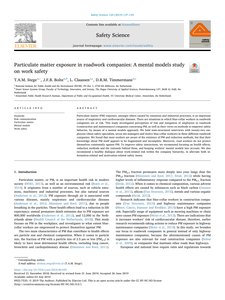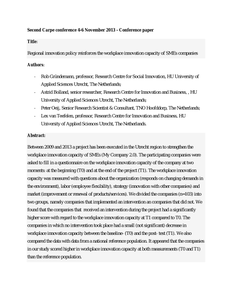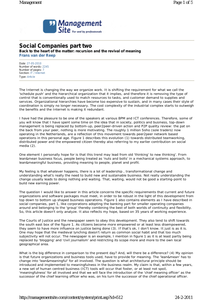Comparing the performance of mutual and commercial insurance companies in the Netherlands between 2008 and 2012, this paper gives insight into the relationship between performance and corporate governance. We specifically focused on ownership in relationship with diversification and scale within the perspective of financialization. Although regulators promote commercial, publicly-listed companies do not outperform mutual companies. They even have a significantly worse combined ratio and a tendency for higher acquisition costs. Surprisingly, stock listed insurers do not have lower cost ratios, despite the assumed shareholder push. We found evidence for economies of scale in acquisition costs, but not in company costs. The sample covers 125 observations in the Dutch non-life insurance market between 2008 and 2012. The insights are of great relevance for a sector in the midst of a rapid reform, where questions regarding consolidation reign supreme.
DOCUMENT
Het internet verandert de manier waarop we werk organiseren. Het maakt de 'schedule push' en de hiërarchische organisatie die het impliceert, overbodig en daarmee verdwijnt het type van control dat van oudsher wordt gebruikt om resources en taken, en klantvraag, levering en services op elkaar af te stemmen. Organisatorische hiërarchieën zijn te duur geworden om te blijven bestaan, en in veel gevallen is de manier waarop ze zaken coördineren gewoon niet meer nodig. De ingewikkeldheid van de kosten van het industriële complex begint de opbrengsten te overtreffen en het internet maakt het overbodig.
DOCUMENT

The Internet is changing the way we organize work. It is shifting the requirement for what we call the ‘schedule push’ and the hierarchical organisation that it implies, and therefore it is removing the type of control that is conventionally used to match resources to tasks, and customer demand to supplies and services. Organisational hierarchies have become too expensive to sustain, and in many cases their style of coordination is simply no longer necessary. The cost complexity of the industrial complex starts to outweigh the benefits and the Internet is making it redundant.
MULTIFILE
Particulate matter (PM) exposure, amongst others caused by emissions and industrial processes, is an important source of respiratory and cardiovascular diseases. There are situations in which blue-collar workers in roadwork companies are at risk. This study investigated perceptions of risk and mitigation of employees in roadwork (construction and maintenance) companies concerning PM, as well as their views on methods to empower safety behavior, by means of a mental models approach. We held semi-structured interviews with twenty-two employees (three safety specialists, seven site managers and twelve blue-collar workers) in three different roadwork companies. We found that most workers are aware of the existence of PM and reduction methods, but that their knowledge about PM itself appears to be fragmented and incomplete. Moreover, road workers do not protect themselves consistently against PM. To improve safety instructions, we recommend focusing on health effects, reduction methods and the rationale behind them, and keeping workers’ mental models into account. We also recommend a healthy dialogue about work-related risk within the company hierarchy, to alleviate both information-related and motivation-related safety issues. https://doi.org/10.1016/j.ssci.2019.06.043 LinkedIn: https://www.linkedin.com/in/john-bolte-0856134/
DOCUMENT

Between 2009 and 2013 a project has been executed in the Utrecht region to strengthen the workplace innovation capacity of SMEs (My Company 2.0). The participating companies were asked to fill in a questionnaire on the workplace innovation capacity of the company at two moments: at the beginning (T0) and at the end of the project (T1). The workplace innovation capacity was measured with questions about the organization (responds on changing demands in the environment), labor (employee flexibility), strategy (innovation with other companies) and market (improvement or renewal of products/services). We divided the companies (n=103) into two groups, namely companies that implemented an intervention an companies that did not. We found that the companies that received an intervention during the project had a significantly higher score with regard to the workplace innovation capacity at T1 compared to T0. The companies in which no intervention took place had a small (not significant) decrease in workplace innovation capacity between the baseline- (T0) and the post- test (T1). We also compared the data with data from a national reference population. It appeared that the companies in our study scored higher in workplace innovation capacity at both measurements (T0 and T1) than the reference population
DOCUMENT

The Internet is changing the way we organize work. It is shifting the requirement for what we call the ‘schedule push’ and the hierarchical organization that it implies, and therefore it is removing the type of control that is conventionally used to match resources to tasks, and customer demand to supplies and services. Organizational hierarchies have become too expensive to sustain, and in many cases their style of coordination is simply no longer necessary. The cost complexity of the industrial complex starts to outweigh the benefits and the Internet is making it redundant.
MULTIFILE

The Internet is changing the way we organize work. It is shifting the requirements for what we call the “schedule push” and the hierarchical organization that it implies, and therefore it is removing the type of control that is conventionally used to match resources to tasks, and customer demand to supplies and services. Organizational hierarchies have become too expensive to sustain, and in many cases their style of coordination is simply no longer necessary. The cost complexity of the industrial complex starts to outweigh the benefits, and the Internet is making it redundant. The question I put forward in this Article, after a short description of how I envision “the change,” is what new requirements should be met by software in order to meet the requirements of the networked economy. Business will develop from Business-to-Consumer (B2C) to Consumer-to- Business (C2B) to People-to-People (P2P), customers more and more taking control over business activities, overhead being replaced by customer focus. This is also a new reality for the software world.
DOCUMENT

In this article, van der Reep argues the need for a new architectural priciple when desgining software systems. The Internet and its capacity to provide social media technology is creating a new P2P networked economy. An economy based around people working together and which will have a major impact on the corporate structure and its business models. However, most of the current software, e.g. ERP or supply chain management systems, support organizational fragmentation where poeple are treated just like 'nuts and bolts'. This will have no future and a shift should be made to a more human centric architecture where 'lean and mean'is replaced by 'lean and meaningful'. Van der Reep calls this architectural principle 'Recursion', where any subset of the system contains all the functionality of the complete system.
DOCUMENT

In 2014, the Dutch government agreed with the food sector to lower salt, sugar, saturated fat and energy in foods. To reformulate, an integrated approach of four disciplines (Nutrition & Health, Food Technology, Legislation, and Consumer Perspectives) is important for food companies (Framework for Reformulation). The objective of this study was to determine whether this framework accurately reflects reformulation processes in food companies. Seventeen Dutch food companies in the bakery, meat and convenience sector were interviewed with a semi-structured topic list. Interviews were transcribed, coded and analysed. Interviews illustrated that there were opportunities to lower salt, sugar and saturated fat (Nutrition & Health). However, there were barriers to replacing the functionality of these ingredients (Food Technology). Most companies would like the government to push reformulation more (Legislation). Traditional meat products and luxury sweet bakery products were considered less suitable for reformulation (Consumer Perspectives). In addition, the reduction of E-numbers was considered important. The important role of the retailer is stressed by the respondents. In conclusion, all four disciplines are important in the reformulation processes in food companies. Reformulation does not only mean the reduction of salt, saturated fat and sugar for companies, but also the reduction of E-numbers.
LINK
Nowadays companies need higher educated engineers to develop their competences to enable them to innovate. This innovation competence is seen as a remedy for the minor profitable business they do during the financial crises. Innovation is an element to be developed on the one hand for big companies as well as for small-and-medium sized companies through Europe to overcome this crisis. The higher education can be seen as an institution where youngsters, coming from secondary schools, who choose to learn at higher education to realize their dream, what they like to become in the professional world. The tasks of the Universities of applied Sciences are to prepare these youngsters to become starting engineers doing their job well in the companies. Companies work for a market, trying to manufacture products which customers are willing to pay for. They ask competent employees helping achieving this goal. It is important these companies inform the Universities of applied Sciences in order to modify their educational program in such a way that the graduated engineers are learning the latest knowledge and techniques, which they need to know doing their job well. The Universities of applied Sciences of Oulu (Finland) and Fontys Eindhoven (The Netherlands) are working together to experience possibilities to qualify their students on innovation development in an international setting. In the so-called: ‘Invention Project’, students are motivated to find their own invention, to design it, to prepare this idea for prototyping and to really manufacture it. Organizing the project, special attention is given to communication protocol between students and also between teachers. Students have meetings on Thursday every week through Internet connection with the communication program OPTIMA, which is provided by the Oulu University. Not only the time difference between Finland and the Netherlands is an issue to be organized also effective protocols how to provide each other relevant information and also how to make in an effective way decisions are issues. In the paper the writers will present opinions of students, teachers and also companies in both regions of Oulu and Eindhoven on the effectiveness of this project reaching the goal students get more experienced to set up innovative projects in an international setting. The writers think this is an important and needed competence for nowadays young engineers to be able to create lucrative inventions for companies where they are going to work for. In the paper the writers also present the experiences of the supervising conditions during the project. The information found will lead to success-factors and do’s and don’ts for future projects with international collaboration.
DOCUMENT